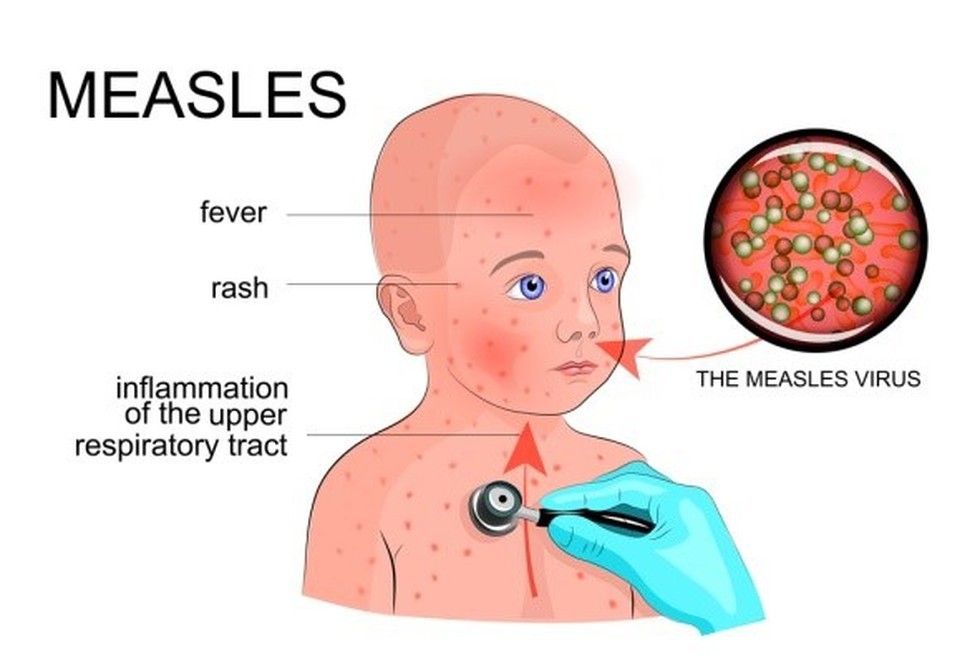Context:
India and many other countries are facing outbreak of Measles, the cases of which are increasing at a faster rate after the Covid-19. According the data of WHO, the maximum number of cases of measles are seen in India which is about 73,536 and after that in Yemen and Pakistan.
What’s in News?
Measles is a highly contagious, serious viral disease. Before the introduction of the measles vaccine in 1963 and widespread vaccination, major epidemics occurred approximately every two to three years and caused an estimated 2.6 million deaths every year.
An estimated 128,000 people died from measles in 2021 among those mostly are children under the age of 5 years, despite of availability of a safe and cost-effective vaccine.
U.S. Centers for Disease Control and Prevention (CDC) staff in Atlanta and around the world work with partners and ministries of health to prevent, detect and stop global measles outbreak.
Measles:
Measles is an airborne disease caused by a virus, and it’s very contagious. Measles is also called as Rubella. Symptoms may develop about 8 to 12 days after you are exposed and lasts for 10 to 14 days.
Measles causes a red, blotchy rash that usually appears first on the face and behind the ears and then spreads downward to the chest and back and finally to the feet.
Symptoms of Measles:
Most common symptoms of Measles include:
- A high fever
- Tiredness
- A barky cough
- Red or bloodshot eyes.
- A runny nose
- A red rash, which starts at the head and spread downward.
Other symptoms of Measles may include:
- A sore throat
- White spots in the mouth
- Muscle pain
- Sensitivity to light.
Causes of Measles:
Measles is caused by a virus called morbillivirus. In fact, if 10 people who were not vaccinated were in a room with someone with measles then nine of those people would also get measles.
Measles is spread by:
- Contaminated droplets that are spread through the air when you cough, sneeze or talk.
- Sharing drinks or foods with someone who has measles.
- Shaking hands or holding hands or hugging someone who has measles.
- From pregnant ladies to their babies.
It can take 6 to 21 days to develop symptoms of measles after the infection. This is the incubation period.
Who is at risk?
Any non-immune person can be infected. Unvaccinated young children and pregnant women are at high risk of severe measles complications.
The overwhelming majority of measles deaths occur in countries with low per capita incomes or weak health infrastructures that struggle to reach all children with immunization.
Damaged health infrastructure and health services in countries experiencing or recovering from a natural disaster or conflict interrupt routine immunization and overcrowding in residential camps increases the risk of infection.
How is Measles diagnosed?
Healthcare provider may order the laboratory tests to find the virus in samples of:
- Blood
- Secretion from nose and throat.
- Urine
Treatment of Measles:
There is no cure for measles. The virus must run its course, which usually takes about 10 to 14 days.
The patient can do following things to feel better:
- Taking acetaminophen or ibuprofen for aches, pain or fever.
- Getting plenty of rest.
- Drinking enough floods.
- Gargling with salt water.
- Avoid harsh light.
Never give aspirin to children without the consultation of healthcare provider because of the risk of Reye’s syndrome.
Complications of Measles:
Complications of Measles of include:
- Diarrhea
- Ear infections
- Pneumonia
- Encephalitis which causes inflammation of the brain, led to seizures, hearing loss or learning disabilities.
- Death
Vaccination for Measles:
There are two types of vaccines for Measles:
- Measles, Mumps, Rubella (MMR) Vaccine: For children MMR vaccine is often given in two shots first one is given around the age of 12 to 15 months and the second one is given at the age of around 4 to 5 years.
- Measles, Mumps, Rubella, Varicella (MMRV) Vaccine: This vaccine is only available for children ages 12 months to 12 years. The first shot is given around the around the age of 12 to 15 months and the second one is given around the age of 4 to 6 years. The second shot can be given after three months of the first shot.
Who should not get a Measles vaccine?
Pregnant women should not get measles vaccine. The persons with immune system disease or who have an allergic reaction from the previous one should not get the measles vaccine. It’s important to discuss with the healthcare providers before being vaccinated.
Precautions for Measles:
- The best way to prevent measles is to get vaccinated.
- People who work in health care centers must wear protective equipment such as masks and gloves.
- They must wash their hands before and after putting on gloves.
- To practice good hand washing technique.




 Weekly Current Affairs One Liners 16th t...
Weekly Current Affairs One Liners 16th t...
 Which District is known as the Medical C...
Which District is known as the Medical C...
 Which was the First Women's University i...
Which was the First Women's University i...








